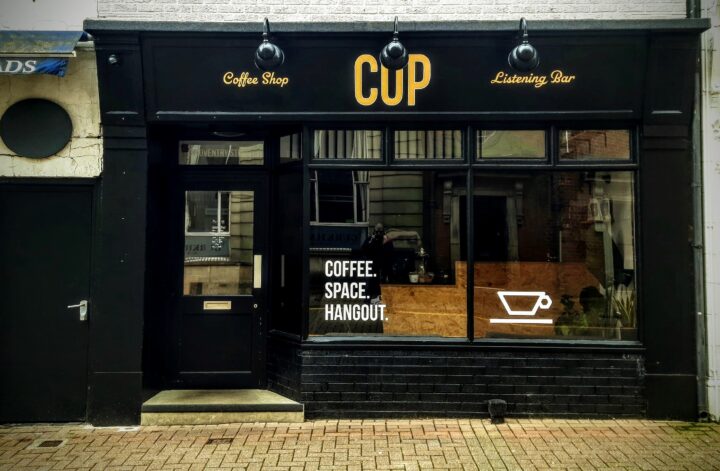Wordsley, Stourbridge, England: 8 degrees, chilly, overcast and with the possibility of rain.
Stress at the West Bromwich Building Society in Kingswinford.
Every Tuesday, my mother collects her pension from the West Bromwich Building Society in Kingswinford. She needs to withdraw the money there to deposit it in the Nationwide Building Society next door to pay her bills.
I don’t understand why she has this scheme; it probably works for her, but physically going into one place and then depositing at another seems illogical nowadays, especially when everything can be done online and via mobile phone. This is particularly true since the West Bromwich Building Society continues to use an outdated system that requires a small deposit book for deposits and withdrawals, a system my grandparents used 50 years ago.
The West Bromwich Building Society also follows a set of bureaucratic rules, and if the Ts are not crossed and the Is are not dotted, then there is a serious problem.
My mother is unable to do her daily chores and tasks outside the house due to her knee operation at the beginning of January, and she is still recovering. She signs a proxy form for me to withdraw her money so I can deposit it in the other building society next door, but every time I go there, there are problems. Today, it was my mother’s signature, supposedly for the cashier, it was different from her usual signature.
This was with the second cashier because I had to be moved from the first one due to her system being down, how crazy is that? Even crazier was that the first cashier was about to pay me when the system went offline and had already accepted my mother’s signature.
When I was directed to the second cashier, someone who knows both me and my mother—since I have been going there every week since I arrived in England, and my mother has been going for at least 20 years—she looked at the signature and doubted its authenticity.
How fucked up is that?
The week before, I had to go and return three times due to bureaucratic issues, and now it is happening again. The cashier started to imply that I would need to get another signature. I began to get annoyed, but without raising my voice, I said that there is a problem in this building society every week.
I also said that my mother was 82 and had recently undergone major knee surgery, and that she is not a stranger but a longstanding regular client. I also said I would tell my mother to withdraw all her money from the establishment and close her account, as it’s impossible to have problems every week over something so simple.
As soon as I had said that, an older woman, the general manageress, suddenly approached from nowhere with an air of superiority and arrogance. She tried to justify the building society’s procedures, a lot of blah, blah, blah, and said condescendingly that she would authorise the withdrawal as if she was doing me a favour.
I tried to rationalise the situation with her by saying that she was not doing either me or my mother a favour, as we are not strangers, especially my mother, while also knowing that my mother could not come because of her condition. They should have been more understanding and attentive to the situation. The manageress did not like that I had called her attention and tried to justify herself again; obviously, a woman in a position always wants to have the last word to feel better.
After withdrawing the money and leaving after the stress, I popped into the next-door building, Society, to deposit the money that had just been withdrawn. Due to all the stress, when depositing the cash and leaving in a rush, I forgot my mother’s magnetic card in the cash dispenser. I had to go back to the second building Society as I had only realised that I had left it in the machine when I was already out in the street doing other things.
I went and spoke to the cashier; he said he would have a look later when the shop is closed, and if it is there, he would send it by post to my mother. I thanked him and left. A lot of stress that could have been avoided, some of it my fault, but I have noticed a distinct difference between the way people work in England and Brazil.
I have the impression that hard, rigid procedures entirely govern traditional institutions and workplaces in England. Everything is dictated by procedures, which might be ideal in a utopian society. However, the society we live in, regardless of where it is—including England—is not utopian and certainly not flawless.
So, when something is slightly off or outside those procedures, it becomes a problem. I think people often do not know how to reason, problem-solve, or think critically; they are so hardwired and brainwashed into corporate culture that doing anything differently becomes almost impossible.
I also believe it is a matter of fear—being afraid to try something different or even wrong, to take a risk, to put themselves on the line with the possibility of someone reprimanding them, pointing a finger in your face, and accusing you of doing something wrong. With so many procedures, people stop thinking; they go on automatic pilot, and there is no improvisation to improve or speed up the situation.
In Brazil, there are established procedures, but improvisation is also a part of the culture and is used when necessary. Brazil survives on improvisation or ‘winging it’, as if everyone knows that we live in a system full of holes, and because of those holes, we need to improvise to survive.
It could also be seen as the same for me, leaving my mother’s card in the machine. I have done it many times in Brazil, in the past and every time, a bank employee went behind the machine to check if the card was there, resolving the issue on the spot, and within minutes, it was sorted. However, in England, it is only resolved after shop hours and within the next couple of days.
I also feel that people in England do not have a strong sense of urgency to get things done, unlike in Brazil. In Brazil, we are constantly rushing to survive from one day to the next. We say that ‘we must kill a lion every day,’ portraying the deep-seated necessity to fight for survival every day, which is not good and probably the exact opposite of what England stands for.
I understand that peace and tranquillity are essential for a good life, work ethic, and ambience, and the lack of urgency can make things work better; however, there are times when deadlines and dates need to be established and met.
The truth is like anything in life, where there are two extremes; usually, the middle is the best option.
Classes until 11:00 p.m., a simple but tasty salad for dinner and in bed by 11:30.
Thank you.
Thanks for reading this blog post. Please explore my other posts and share your thoughts in the comments section.
Richard

















